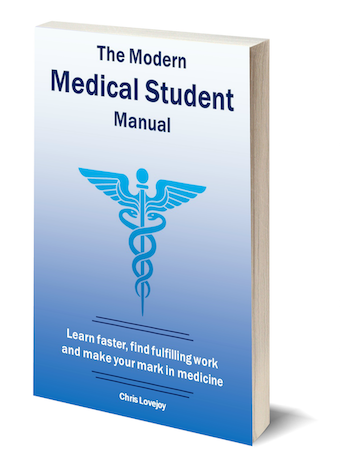Commanding Clearer Communication (Part 2)
See Chapter 6 Part 1 here.
Learning to write well
Some people find writing comes more naturally than others. However, writing ability is something that can be learnt. Doing so also increases clarity of thought more broadly. I always struggled with writing but, after hard work over many years, have reached the point where I can write this book. If you have made it this far in the book, I must at least be doing something right!
Essay prizes
Essay prizes offer a fantastic opportunity to develop writing ability, gain CV points and make money all at the same time. All the different medical specialties are very keen to encourage students to consider their area in depth, hoping to entice them to choose it later down the line, and thus many offer healthily-sized financial prizes. There are many prizes available and some receive low numbers of applicants.
Finding an essay
There are essay prizes on a wide variety of topics. I would advise thinking firstly of your interests and then finding an essay asking a question you would be interested in knowing the answer to. This provides the organic motivation required to push through difficulty of writing the essay.
To find niche essay titles that are in an area of your personal interest, I would suggest searching that area along with some variation of ‘medical student prize/essay/competition’.
For example, after reading a lot of science fiction I wanted to write a science fiction short story related to medicine and managed to find a competition run by the University of Glasgow (but open to everybody): http://scifimedhums.glasgow.ac.uk/writing-competition/.
Many essay prizes are not particularly well advertised but can be found in the hidden recesses of the internet so it’s well worth doing a thorough search.
Useful websites to check out for essay titles:
- The Royal Society of Medicine have loads of essay prizes in all different specialities: https://www.rsm.ac.uk/prizes-awards/students.aspx
- Your university is likely to have some (and here the potential pool of applicants is much smaller)
- Specific specialties and their associated societies
Alternatives to essays
An alternative way to write and make money as a medical student is writing freelance articles for websites or other medical outlets. I dabbled in this but felt restricted by some of the restraints, such as having to write on specific topics. If you are interested here is a great guide about how to get into it:
https://blog.freelancersunion.org/2014/09/10/how-to-start-freelance-writer/
If you think writing may be a significant part of your future career, freelance writing offers the advantage of providing a portfolio of work which can help to secure future employment.
Starting an internet blog is another alternative. It may not offer the same CV points or financial gain but it does offer the freedom to write about whatever is on your mind. It can also play a role in self-education, as outlined in Chapter 4. There are also rewards that you can’t really predict. For example, after one post someone approached me asking to collaborate on a project and after another the editor of an online magazine requested to feature it.
Writing for scientific journals is another great way to hone skills and support future applications. This is one part of undertaking your own research, as discussed in Chapter 5. However, there are many alternatives, such as literature reviews (where you summarise research in an area of interest), perspective pieces (where you give an opinion) and case studies (about interesting patients).
Principles for improvement
- Get started
It sounds obvious but this can be the hardest step.
It took me a long time to get started with writing. The perfectionist within me wanted to capture everything perfectly yet I could never find the right words. I remember countless hours at school trying to write essays or short stories and just looking at a blank page, not able to start.
It can be difficult to accept that your writing is not as good as you want it to be. You may have your heart set on winning an essay prize and worry that you’ll work hard and have nothing to show for it.
However, it’s important to accept that you may well not win and be happy to write it regardless. I used essay prizes to overcome my writer’s block by picking one essay prize that looked interesting then committing to writing and submitting an essay by the deadline no matter what. As a result, some of my early essays were pretty poor but I submitted them anyway. This gave me experience with the process of writing and improved my skills. I also came to accept that my essays will never be perfect and there’s no way to guarantee I’ll win a prize. Seth Godin advises us to “always be shipping”; to finish the work we start and share it with others.
Since overcoming my initial life-long writer’s block, I’ve discovered a deep love of writing and have written many essays, blog posts and articles as well as this book. I appreciate not everyone will develop this depth of enjoyment but it’s worth the time investment to find out. I highly recommend entering at least one essay prize while at medical school for this purpose.
2. Improve
Aim to learn as much as possible from everything that you write. Improving writing involves trial and error as well as learning from feedback.
Friends who will kindly proofread your work are invaluable. I also find it useful to read back my work a month or so after writing it, trying to look through the eyes of someone who has never read it before. Sometimes you will receive feedback on essay prize entries but this tends to be fairly limited. The level of ‘success’ of a piece of writing can be a rough indicator of its quality; whether an essay wins a prize or how many comments or views a blog post receives.
Don’t be afraid to show your work to others. It can be tempting not to open up your work to the criticism of others but this feedback is essential. It can be easy to assume you have got your point across clearly because it already makes sense to you. It isn’t until someone else reads it that you will know for certain.
Further resources
If you are interested in developing writing, two of the best books on this subject are:
On Writing Well by William Zinsser, which is a comprehensive breakdown of how to write good non-fiction, written with beautiful clarity (being true to itself) that is a pleasure to read and will change the way you write forever.
Bird by Bird by Anne Lammott, which considers writing from the human angle; the anxieties and challenges of being a writer. Although written for a fiction-writing audience, contains many lessons that hold true for writing fiction or non-fiction.
MEDICAL STUDENT CHALLENGE 3: Get at least ten hours of teaching experience.
MEDICAL STUDENT CHALLENGE 4: Enter at least one essay prize. Select a title and commit to submitting an essay no matter what.
CHAPTER 6 SUMMARY
• Effective written and oral communication helps in medicine and other areas of life.
• There are some medical conversations you won’t have as a student. Developing good oral communication skills helps you adapt to this once qualified.
• Oral communication skills can be improved through talking to patients, members of the healthcare team and through teaching.
• As a medical student, writing ability can be developed through essay prizes, freelance articles, writing for scientific journals and blogging.
• The first hurdle is to get started. Improvement comes from continual trial-and-error.
Continued in the Conclusion.
This is a chapter from The Modern Medical Student Manual. A full list of chapters are below:
- Introduction: From That Day To This Book
- Chapter 1: Medicine from Fifty Thousand Feet: Perspective, Targets and Limits
- Chapter 2: The Fundamentals of Fast Learning - Part 1 and Part 2
- Chapter 3: Mastering Clinical Medicine - Part 1 and Part 2
- Chapter 4: Increasing our Impact (and the power of Self-Education) - Part 1 and Part 2
- Chapter 5: A Scientific Approach to Research - Part 1 and Part 2
- Chapter 6: Commanding Clearer Communication - Part 1 and Part 2
- Conclusion
Plus Bonus Chapters:
- Bonus Chapter 1: If Medicine Gets You Down
- Bonus Chapter 2: Is Medicine Right For Me?
- Bonus Chapter 3: Memorisation Techniques (by Dr James Hartley)
- Bonus Chapter 4: Learning from Others in Medicine


Comments powered by Disqus.